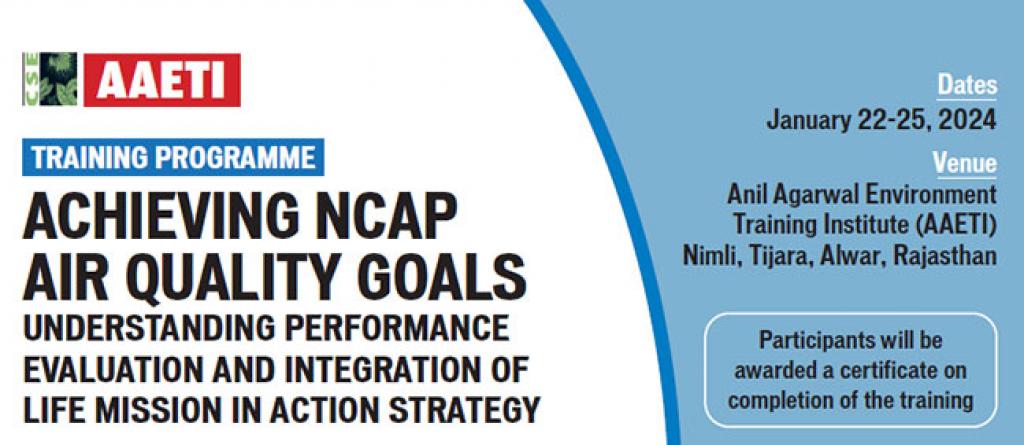Achieving NCAP air quality goals: Understanding performance evaluation, and integration of LIFE mission in action strategy: CSE

![]()
Date: 22- 25th Jan 24 / Venue: Rajasthan
The Centre for Science and Environment (CSE) is a public interest research and advocacy organisation based in New Delhi. CSE researches into, lobbies for and communicates the urgency of development that is both sustainable and equitable. The scenario today demands using knowledge to bring about change. In other words, working India’s democracy. This is what we aim to do.The challenge, we see, is two-pronged. On the one hand, millions live within a biomass based subsistence economy, at the margins of survival. The environment is their only natural asset. But a degraded environment means stress on land, water and forest resources for survival. It means increasing destitution and poverty. Here, opportunity to bring about change is enormous.But it will need a commitment to reform – structural reform- in the way we do business with local communities. On the other hand, rapid industrialization is throwing up new problems: growing toxification and a costly disease burden. The answers will be in reinventing the growth model of the Western world for ourselves, so that we can leapfrog technology choices and find new ways of building wealth that will not cost us the earth. Our aim is to raise these concerns, participate in seeking answers and in pushing for answers, transforming these into policy and so practice. We do this through our research and by communicating our understanding through our publications.
Under the National Clean Air Programme (NCAP) 131 non-attainment cites including 42 million plus cities are implementing clean air action plans. Also the 15th Finance Commission fund supports clean air initiatives in million plus cities. In order to accomplish the goals of NCAP (20 to 30 per cent reduction in particulate pollution by 2024) and 15th Finance Commission (5 per cent annual reduction over 5 years), these programmes require implementation of time-bound multi-sectoral action. The centre has further enhanced the target to 40 per cent reduction in particulate pollution by 2026 or achieving 60 microgramme per cubic metre.
Since 2021-22, the 15th Finance Commission’s fund disbursement has become performance-based. Cities need to demonstrate decrease in PM10 levels and increase in good days as per the air quality index. This is reported in clean air actions in Swacchh Vayu Sarvekshan. NCAP has also led to resource mobilisation through convergence of other schemes and funding in the concerned sectors that aid in air quality improvement. CPCB through PRANA monitors and assesses the physical and financial status of city action plans implementation. This is further supported by the state action plans.
The most recent addition in NCAP is Lifestyle for Environment (LiFE) Mission indicators. State and city action plans are required to integrate 14 LiFE indicators related to clean air plan along with annual targets and quarterly progress monitoring.
All this require an in-depth understanding and knowledge of the multi-sectoral strategies, how these can be designed as part of funding strategies and implemented for air pollution reduction. This training programme has been specially designed to support implementation, performance evaluation and mid-course assessment of the clean air action plans in NCAP cities.
Centre for Science and Environment (CSE) is inviting participation in its four-day Training Programme on Achieving NCAP air quality goals: Understanding performance evaluation and integration of LIFE mission in action strategy on January 22-25, 2024 at Anil Agarwal Environment Training Institute (AAETI) located at Nimli, Tijara, Alwar district, Rajasthan. This programme represents our initiative to promote good regulatory practices on clean air action planning through knowledge sharing and capacity building.
This training programme is specially designed for officials from the concerned implementing departments and agencies including State Pollution Control Boards (SPCBs), Urban Local Bodies (ULBs) and other officials involved with NCAP, clean air action planning and implementation.
Training session modules will enable interaction with experts and will focus on the following:
- How is NCAP and funding moving action on ground: NCAP framework for clean air action planning and compliance, understanding how to best utilise the PRANA portal for planning and implementation, methods of setting targets for micro action plans and state action plans and integration of LiFE Mission indicators.
- Performance evaluation: Performance based funding, assessment including scoring pattern based on air quality and measures undertaken and Swacchh Vayu Sarvekshan framework and incentives
- Airshed based planning: Framework for managing regional air quality
- Governance: Institutional framework for effective air quality governance, monitoring and compliance
- Monitoring: Strengthening air quality monitoring for information dissemination, compliance reporting and evaluating changes in air quality with respect to the actions taken
- Emission sources: Understanding emission sources and profiling, new approaches to pollution source assessment, real-time source contribution visualization and assessment of carrying capacity
- Multi-sectoral air pollution control strategies: Specified actions and implementation related to vehicles and transport, industries and power plants, municipal solid waste, construction and demolition waste, road dust etc
- Hotspots based planning approach for hyper local action: Identification and management
For more information, please contact
Shubhansh Tiwari
Mobile: +91- 8448337484
Email: shubhansh.tiwari@cseindia.org
Priyanka Chandola
Mobile: +91 – 9810414938
Email: priyanka@cseindia.org

